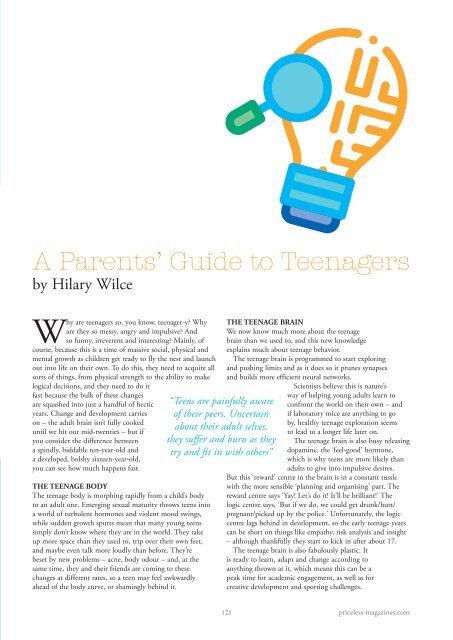Surrey Homes | SH71 | Sept & Oct 2020 | Kitchen & Bathroom supplement inside
The lifestyle magazine for Surrey - Inspirational Interiors, Fabulous Fashion, Delicious Dishes
The lifestyle magazine for Surrey - Inspirational Interiors, Fabulous Fashion, Delicious Dishes
Create successful ePaper yourself
Turn your PDF publications into a flip-book with our unique Google optimized e-Paper software.
A Parents’ Guide to Teenagers<br />
by Hilary Wilce<br />
Why are teenagers so, you know, teenager-y? Why<br />
are they so messy, angry and impulsive? And<br />
so funny, irreverent and interesting? Mainly, of<br />
course, because this is a time of massive social, physical and<br />
mental growth as children get ready to fly the nest and launch<br />
out into life on their own. To do this, they need to acquire all<br />
sorts of things, from physical strength to the ability to make<br />
logical decisions, and they need to do it<br />
fast because the bulk of these changes<br />
are squashed into just a handful of hectic<br />
years. Change and development carries<br />
on – the adult brain isn’t fully cooked<br />
until we hit our mid-twenties – but if<br />
you consider the difference between<br />
a spindly, biddable ten-year-old and<br />
a developed, bolshy sixteen-year-old,<br />
you can see how much happens fast.<br />
THE TEENAGE BODY<br />
The teenage body is morphing rapidly from a child’s body<br />
to an adult one. Emerging sexual maturity throws teens into<br />
a world of turbulent hormones and violent mood swings,<br />
while sudden growth spurts mean that many young teens<br />
simply don’t know where they are in the world. They take<br />
up more space than they used to, trip over their own feet,<br />
and maybe even talk more loudly than before. They’re<br />
beset by new problems – acne, body odour – and, at the<br />
same time, they and their friends are coming to these<br />
changes at different rates, so a teen may feel awkwardly<br />
ahead of the body curve, or shamingly behind it.<br />
“Teens are painfully aware<br />
of their peers. Uncertain<br />
about their adult selves,<br />
they suffer and burn as they<br />
try and fit in with others”<br />
THE TEENAGE BRAIN<br />
We now know much more about the teenage<br />
brain than we used to, and this new knowledge<br />
explains much about teenage behavior.<br />
The teenage brain is programmed to start exploring<br />
and pushing limits and as it does so it prunes synapses<br />
and builds more efficient neural networks.<br />
Scientists believe this is nature’s<br />
way of helping young adults learn to<br />
confront the world on their own – and<br />
if laboratory mice are anything to go<br />
by, healthy teenage exploration seems<br />
to lead to a longer life later on.<br />
The teenage brain is also busy releasing<br />
dopamine, the ‘feel-good’ hormone,<br />
which is why teens are more likely than<br />
adults to give into impulsive desires.<br />
But this ‘reward’ centre in the brain is in a constant tussle<br />
with the more sensible ‘planning and organising’ part. The<br />
reward centre says ‘Yay! Let’s do it! It’ll be brilliant!’ The<br />
logic centre says, ‘But if we do, we could get drunk/hurt/<br />
pregnant/picked up by the police.’ Unfortunately, the logic<br />
centre lags behind in development, so the early teenage years<br />
can be short on things like empathy, risk analysis and insight<br />
– although thankfully they start to kick in after about 17.<br />
The teenage brain is also fabulously plastic. It<br />
is ready to learn, adapt and change according to<br />
anything thrown at it, which means this can be a<br />
peak time for academic engagement, as well as for<br />
creative development and sporting challenges.<br />
121 priceless-magazines.com


















